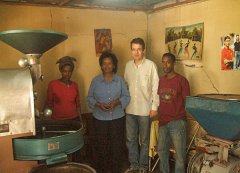
When I first came to Ethiopia one year ago, I drunk perfect Cappuccino and Espresso every day. The country has a long tradition of coffee consumption and the Italian occupation (as bad as it was) certainly also influenced this tradition.
So I thought: Why do we only import green coffee from here? Why do we spend billions on developing aid but do not buy finished roasted coffee to really help the country develop?
The reason is that there has always been a custom duty rate of 30% on roasted coffee, while there was none for green coffee. Due to this policy, Germany is today the 4th biggest coffee exporter in the world! Luckily, in 2007 this duty rate was canceled in the EU.
But today there are extremely efficient and huge roasting companies in Europe. They have no interest to import roasted coffee from outside. Even the “Fair Trade Coffees” are all roasted in Germany, never in developing countries (in fact I do not think the “fair trade program” really solves the main problem of Ethiopia as it only offers little more money to the farmers). Jobs in roasting, packaging and marketing do almost not exist. The country does not develop. Still over 80% of the people are very poor farmers.
During my stay in Addis Ababa I also met graduate students. One of them, Tewodros Demisse, almost left to Dubai as he did not see a chance to finance his studies and find a sufficiently paid job (of about 80 Euro per month).
In March 2007 I decided to import for the first time Ethiopian roasted and packed coffee to Germany. It took me almost 12 months to select 2 good suppliers, to develop this web-side, to find potential clients and to design the packaging.
In 2 weeks I will receive my first 200 Kilos of coffee here in Hamburg and I will start selling it on this website. The money I earn will be reinvested in Ethiopia for better packaging machines, for improved coffee roasters and for educating the employees of my suppliers in the areas of marketing and sales. This should help them to export also to other countries and to hire more educated people.
Soon I will also invite journalists to let them try the coffee and to inform them about this story. If you wish to be invited please write to: hallo@solino-coffee.com.
PS: I write in English so that my friends and suppliers in Ethiopia can understand and participate in this Blog.
PPS: The movie Black Gold that I saw also in Addis Ababa summarizes very well the situation:


Trade not Aid – Wake up and smell the coffee!
That’s some pretty strong stuff at the end of that trailer.
PC on the PC – well people won’t buy the stuff and certainly won’t drink it just because its PC; they want to drink something that tastes great while there on their PC.
Luckily, you really found some excellent coffee and I’ll vouch for that.
Well, I am ready to order.
Pingback: FRoSTA Blog » Blog Archive » Solino Kaffee Projekt zur Förderung Äthiopiens
Dear Solino!
Ur idea has always been my keen dream as an Ethiopian born to a coffee farmer-(painfully, unfulfilled, though)! I yearn for the day when aid will be left 2 history! And, if u succeed, that will be ‘aid proper’ for us! Pls, how can I know of ur progress on the project?
Thks & wish u good luck!
Dear Tesfaye, thanks for your interest! Actually we have started 2 years ago to sell roasted Ethiopian coffee in Europe and slowly we increase our presence here in Germany. But it is not easy because finding reliable serious roasters in Ethiopia is a real challenge. Not in terms of the coffee quality, but rather in terms of the packaging, administration and timing of the deliveries.
Are you still involved in coffee production or farming?
All the best!